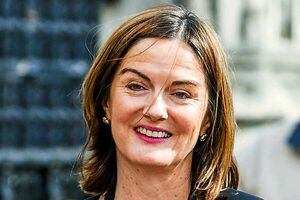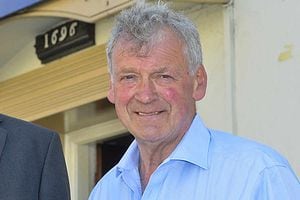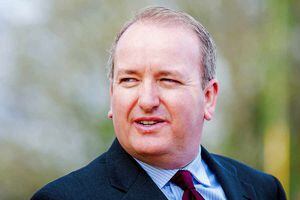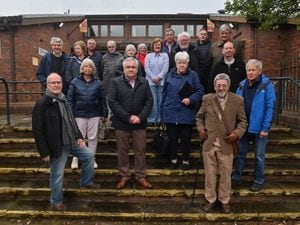Severn Hospice speaks out against assisted dying law
A hospice that cares for people in Shropshire today said it would never associate itself with legalised assisted dying.

Severn Hospice spoke out to reassure patients and families that its only priority was to extend life and bring comfort to those it cares for.
It comes as West Midlands MP Rob Marris has introduced a Private Member's Bill calling for terminally ill individuals to have a choice over their end-of-life care.
It was revealed today that Telford MP Lucy Allan will be among those voting in favour of the Bill when it is debated in Westminster next month.

Telford's Conservative MP Lucy Allan supports the Assisted Dying Bill.
She said: "The time is right for Parliament to debate this issue. There is a clear need for legal clarity. This Bill gives the terminally-ill choice in the manner of their death; it gives them a say in when prolonged suffering goes beyond what they can endure. It offers the terminally-ill the option of dying in peace.
"There are many who misunderstand this Bill and argue that it would be the first step on the path to legalising euthanasia. This Bill only relates to those suffering a terminal illness.
"The Bill does not apply to those who are disabled, elderly, depressed or suffering from dementia. This Bill does not legalise euthanasia. For me it is about personal freedom, about giving the individual the right to choose what is best for them and their family at the end of life. It cannot be right that the state can force someone dying a painful death, to have that process of dying prolonged against their wishes. Our lives belong to us, not to the state.
"We all have an innate need to maintain some control, autonomy and dignity, as much at the end of life as we do during life. It is not for the state to take that from us.
"I hope that as many MPs as possible attend this important debate and vote on this issue."

But Glyn Davies, Conservative MP for Montgomeryshire, stands against legalising assisted dying and today said it would be one of the most important debates of this Parliament. He said he supported the stance of Severn Hospice, adding: "It is true that as a society, we have not given enough attention to managing death – not remotely enough attention to palliative care. We invest too much in prolonging life and not enough in making the passage from life to death more comfortable. The most vulnerable do not have a loud voice.
"I hope to speak in this debate and try to persuade my colleagues to throw this dangerous, misguided Bill out. Inevitably, legalisation will lead to the normalisation of suicide and self-imposed pressure to end life."

Wrekin MP Mark Pritchard said he did not support euthanasia but said patients had the right to refuse treatment.
He said: "As vice-chairman of the parliamentary pro-life group I do not support euthanasia, but I do think patients, not family members, should have the exclusive right to refuse treatment and resuscitation."
But Paul Cronin, chief executive of Severn Hospice, said the independent charity wanted to distance itself from any idea of legalised euthanasia.
He said "We would not participate in, or provide a venue for, assisted suicide or assisted dying.
"Our mission as a hospice is to provide the best care and a better life for people living with an incurable illness, and for those important to them."
"We are not entering into the political debate; we will continue to provide the best care and better life for people living with an incurable illness and for those important to them."
The hospice has sites at Apley Castle in Telford and Bicton Heath in Shrewsbury, caring for people in Shropshire and Mid Wales. It provides palliative care at those sites and also at home for patients.
Mr Marris, the Labour MP for Wolverhampton South West, says he wants to see terminally ill individuals have a choice over their end-of-life care.
His proposal is essentially the same as the Assisted Dying Bill introduced by Lord Falconer last year, which ran out of time before the General Election.
It would mean those with less than six months to live, who are of sound mind and a settled opinion, would be allowed to ask for a lethal prescription of drugs.
There would, of course, be safeguards, including the need for two doctors and a judge to agree before someone could be given assistance to end their life.
And as MPs get ready to discuss the controversial topic in the House of Commons on September 11, the region's representatives in Parliament, as well as residents, campaigners and community leaders, today waded into the debate.
The issue crosses party politics. The Bill has been brought before Parliament by Labour's Wolverhampton South West MP Rob Marris.
Telford's Conservative MP Lucy Allan today spoke of her support for Mr Marris but Glyn Davies, Conservative MP for Montgomeryshire, stands against legalising assisted dying. Wrekin MP Mark Pritchard said he did not support euthanasia but said patients had the right to refuse treatment.
Paul Cronin, hospice chief executive, said that by speaking out today, he hopes to end any speculation about the role of the hospice in assisted dying. He said he would not get into a political debate on the subject. The hospice's stance will not change, regardless of the vote by MPs next month.
Mr Cronin added: "We would not participate in, or provide a venue for, assisted suicide or assisted dying."
Wolverhampton-born backbencher Mr Marris says he simply wants to see terminally-ill individuals have a choice over their end-of-life care.
He came top in this year's ballot for backbench legislation which means his Bill will be debated on September 11.
His proposal is essentially the same as the Assisted Dying Bill introduced by Lord Falconer last year, which ran out of time before the general election.
Mr Marris said: "The public are clearly in favour of a change in the law and it is right that Parliament now debates this issue. Lord Falconer's Assisted Dying Bill won two key votes and showed there was clear support among peers for law change, the only barrier in the way was time.
"Alongside the vast majority of the public, I am in favour of terminally-ill people who are of sound mind having choice at the end of life. It is a choice that I would want for myself and I do not think we should be denying this to people who are facing an imminent death."
Mr Marris and Lord Falconer have a powerful ally in a former director of public prosecutions. Sir Keir Sarmer drew up guidelines that spelt out how people who acted with compassion might avoid prosecution for assisting a suicide.
He revealed at the weekend that he is now convinced that it is time for a new law to save dozens of Britons every year from travelling to the Zurich clinics of Dignitas to end their lives. He said: "The law needs to be changed. The important thing is to have safeguards."
Campaigner: Legalised euthanasia in UK would make world very scary
Campaigner Nikki Kenward and her husband Merv say the right path in the assisted dying debate remains obvious.
The 62-year-old mother from Shropshire was initially fully paralysed for more than five months and has been in a wheelchair since. She's spoken openly about how she wanted to end her life at the time.
But now she's embroiled in a struggle, along with her husband, to make sure assisted suicide remains illegal.
And the couple today backed the very clear stance by the Severn Hospice that distances its work from any future role in assisted dying.
Mrs Kenward, of Aston-on-Clun, who suffers from Guillian-Barre syndrome, said: "It is wonderful news to hear that a hospice has come forward with such an important statement.
"In Europe where it is legalised the numbers of people with these conditions who are euthanised has grown rapidly. This is probably one of the most vulnerable groups.
"There are no human rights for killing yourself.
"I think it would be a very ugly and very scary world if euthanasia was legal in the UK. It would create a new meaning of death. I faced death, I lay for many hours and I thought I could die."
Campaign group Dignity in Dying says one person a fortnight goes to Dignitas in Switzerland from the UK to end their lives.
Mrs Kenward and her husband revealed earlier this year they launched legal action against Alison Saunders, the Director of Public Prosecutions, and the Attorney General over the DPP's current prosecution policy in relation to the law on assisted suicide.
The Suicide Act 1961 makes it a criminal offence to assist or encourage suicide.
The DPP has a discretion on whether to prosecute according to the published policy.
The couple have been given permission to challenge the DPP's actions, arguing that the DPP had in fact "changed" the policy and made it more "liberal".
They argue that the significance and legality of the change should now be properly assessed as they claim the DPP's actions are "unconstitutional".





